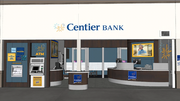News
An industry holds its breath
November 3, 2005
Whether you own an ATM or share a percentage of your c-store's ATM surcharge with an independent deployer, you want the most from your investment. And you've probably noticed that processors and independent sales organizations (ISOs) are vying for your attention, dangling dynamic service and maintenance contracts in front of you.
 This story and all the great free content on ATMmarketplace is supported by: Request free info from this company!  |
Mergers and acquisitions allow ISOs to operate ATMs for less. At the same time, processors are becoming so large that they service ATMs, in addition to processing transactions, for less than most ATM deployers.
"Twenty years ago there were about 200 processors in the ATM space," Mantha said. "Today that has been cut tenfold."
With fewer transaction processors, ISOs have fewer companies to choose from for service. But as companies have merged, they have combined and added services, allowing their customers one-stop access to benefits and services that otherwise would have been scattered all over the phone book, if they were available at all.
More on the menu
Services available from transaction processors now may include fraud monitoring, dispatch, cash replenishment, first- and second-line maintenance -- even administering ATM advertising campaigns.
"The processing world today is extending beyond traditional click processing, where the transaction is simply authorized and settled," said Jan Estep, manager of Minneapolis-based U.S. Bank's processing business, Elan Processing Services.
Elan, typical of the currently dominant processors, expanded its service offerings over the years through acquisitions. In May, Elan's parent company, U.S. Bank, completed its third major acquisition in the processing space when it bought Genpass Technologies, increasing the number of ATMs for which it processes transactions to 31,000.
ATM deployers have been wooed by processors like U.S. Bank and the nation's largest transaction processor, First Data Corp., because of the multiple services they provide.
But Peter Kulik, EFT product manager for Cincinnati-based Fifth Third Bank Processing Solutions, sees a drawback when it comes to customized service.
"From an end-customer perspective, it might become more difficult with a big organization because you don't have the leverage for unique functionality that you would with a small processor."
That's why some deployers are bringing processing in-house, Mantha said. Very small and large deployers will be more likely to bring processing and other operations that affect their ATM networks in-house.
Settling down?
Will the shrinking number of processors force mid-sized operators to settle?
Kevin Gregoire, executive vice president of product development for Brookfield, Wis.-based Fiserv EFT, says no.
"We're in a very competitive market," he said. "I don't think we'll have a market so small where pricing (and services) won't be competitive."
Mike Cowart, director of operations for Atlanta-based RBS Lynk Inc.'s ATM Services division, agrees. He said the already-present distinction between banking-focused and merchant-focused processors will become more defined as processors specialize.
"I think there will always be some kind of difference there. Like in any industry, you focus on a particular sector," he said.
This article appeared in theC-store Self-Service Executive Summary, Winter 2005.
 ChatGPT
ChatGPT Grok
Grok Perplexity
Perplexity Claude
Claude













